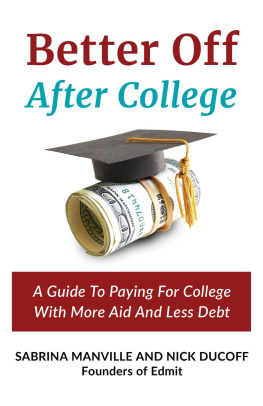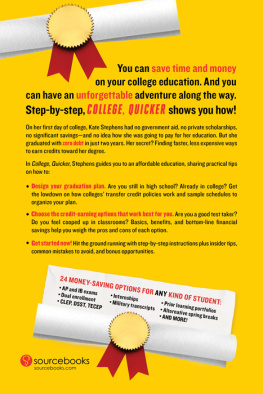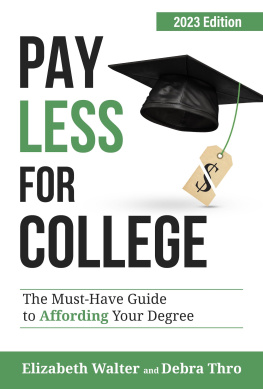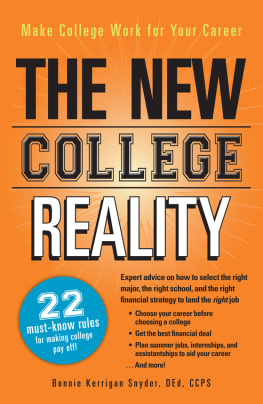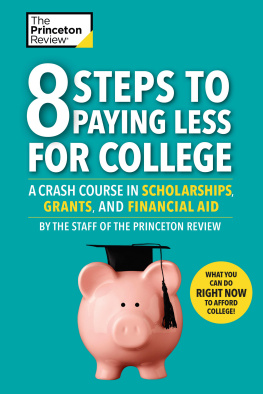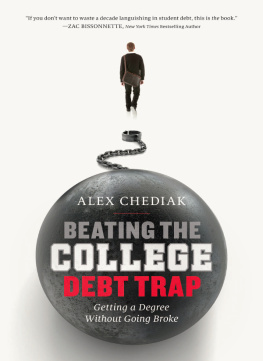Better Off After College
A Guide to Paying for College With More Aid and Less Debt
By Sabrina Manville and Nick Ducoff
Copyright 2019 by Edmit, Inc.
All rights reserved. No part of this book may be reproduced or used in any manner without written permission of the copyright owner except for the use of quotations in a book review. For more information, address: betteroff@edmit.me
FIRST EDITION
ISBN: 9781702099073
www.edmit.me
Praise for Better Off After College
College costs can be blinding. This is THE guide to college finance that every prospective student and parent should read so they can make a better-informed decision as they choose where and when to apply and where to attend.
Michael B. Horn, Coauthor, Choosing College
Lets face it, understanding and navigating the world of college financial aid is nearly impossible for most people. Better Off After College is the much needed road map for anxious families trying to sort through the nomenclature, technical details, complexities, and myths and misconceptions that are rife in the world of financial aid. There is still a lot to digest, but the authors bring clarity and common sense to one of the most important financial decisions that students and their families will make.
Dr. Paul LeBlanc, President, Southern New Hampshire University
An excellent practical guide that demystifies the cost of college and the complex and nuanced financial aid process.
Dr. Philomena V. Mantella, President, Grand Valley State University
Attending college is still one of the very best economic investments an individual can makebut today this decision is higher-stakes than in years past, and requires more analysis. Better Off After College is a useful and practical guide for students, parents, and families looking to understand this process.
Dr. Sean Gallagher, Executive Professor of Educational Policy, Northeastern University
As any parent who has sent a child to college can attest, financial aid is very complicated. Although there's no single solution that will work for everyone, Better Off After College addresses financial aid and broader issues around education finance with practical advice to help families make better decisions about how to choose a college and how to fund that choice.
Stephen M. Smith, Cofounder, Naviance
As a parent and former provost I understand the many hurdles and pitfalls that come with college finances. This book is a much needed primer for parents and students that will help families work their way through the many aspects of paying for college. In a time when student debt is continuing to grow, this book is more important than ever, and will become a useful reference for everyone working with students and families, from college counselors to admissions staff. I will be giving copies of this book to all of the families in the college bound programs I work with.
Dr. Terri Givens, Founder and CEO, The Center for Higher Education Leadership
Table of Contents
H igher education is a central part of the American dreamwhether you are a high school student or an adult working full-time while earning a degree later in life. It opens opportunities, provides upward mobility and makes us healthier and happier people (yes, the data does show that!).
As parents, we aspire for our children to flourish, and to be better off than we areand for that, were willing to make countless sacrifices along the way. It may feel like providing them the opportunity to go to college is the last big gift we can give our children before they leave our homes and become independent. And so, we stretch.
But weve also seen the scary numbers and heard the cautionary tales. College tuition is rising faster than inflation, and student loan debt has passed the trillion-dollar mark. College is likely to cost you tens of thousands of dollars per year, perhaps even hundreds of thousands of dollars all-in. And to pay for it, many students and their parents are taking on large amounts of debt. Student debt isnt just a student problem; its a family problem.
The big question: is it worth it?
We hear this question over and over when talking to students and parents about their college decision. Families are debating where to apply, whether to go to a more expensive school over a more affordable one, or sometimes even whether a student should go to college at all. And they want to know how much student debt is too much.
Like so many complex questions, the answer is that it depends .
Study after study shows that college does pay off. College graduates make more than $1,000,000 more in a lifetime than high school graduates, on averagewhich more than pays for the initial tuition costs.
But no one is average. The cost you pay (including interest payments on large loans), the time in college, the economic climate and career choices after collegeall of these factors and others can swing the result from positive to negative. The truth is that college is a great investment when the decision is made well . But when its made without careful consideration, it can saddle you with debt for 20 years or more.
We left our jobs as university leaders to start Edmit because we believe you should not have to become an expert in the field of higher education to make a great decision about where and how to send your student to college. We know families are eager for help and overwhelmed by all the numbers, terms, jargon, and process. We also believe you should feel empowered in this process. Really! Colleges are competing aggressively for studentsand they need you as much as you need them.
Although the purpose of this book is to give you the best information and advice about the dollars and cents of college, we know that money isnt everything and that college is more than just career preparation for a higher salary. For us, going to college was a seminal life experiencea part of growing up into the people weve become. Perhaps you feel the same way, and perhaps you have certain hopes and dreams about what college will be for your student.
Were here to tell you that you can give them those experiences, and the gift of higher education, without endangering your financial future.
This book is designed to be your primer for every stage of the process: starting with saving, all the way through deciding where to go and how youre going to pay for it. Weve been deep in the world of higher education for many years, and this book represents what we think you should understand at every step, and what we would do if starting the process with our children (which we have, with 529 plans for our little ones!). It is organized chronologicallyso you can choose where to begin based on where your student is in the process, though many of the fundamental terms we use throughout the book are defined in Chapter Two.
Youll see that we address you frequently in the book and refer to your studentso, who are you? You may well be a parentbut you could be a family member of someone aspiring to college, an advisor or counselor to one, or even a high school student yourself. Weve written the book with parents in mind, but we have written with enough depth to be helpful to those with more experience in this topic as well. We are primarily addressing the traditional college student: someone who is of high-school age and will be a first-time freshman.
Next page
